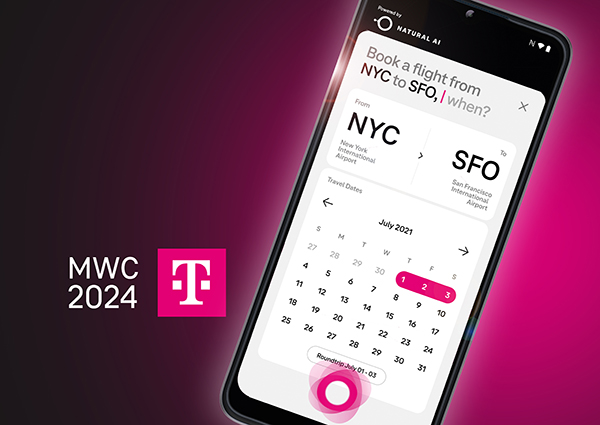It is to demo the concept at Mobile World Congress 2024 with Qualcomm and Brain.ai
Deutsche Telekom will its concept of an AI phone with Qualcomm Technologies and Brain.ai in Barcelona at the end of this month. An AI-based assistant replaces the apps on the smartphone; all the owner has to do is issue voiced or text-based instructions, such as “book me an airline ticket”.
DT’s “generative interface” is powered by Brain.ai and will be able to carry out many everyday tasks, apparently, that normally we’d use apps for.
Using AI, it takes over the functions of a wide range of apps and can carry out all daily tasks that would normally require several applications on the device. The concierge can be controlled effortlessly and intuitively via voice and text.
AI for everyone
DT showed off two use cases integrated into Telekom’s T Phone, which is widely available. It said in a statement, “This underlines the Group’s commitment of introducing innovations on devices that are already on the market and making them accessible to everyone”.
The AI is located in the cloud, and so the functionality will be available on more basic models.
DT is also showcasing a version of an AI smartphone based on the Qualcomm’s Snapdragon 8 Gen 3 Reference Design, in which the AI processing is done on the device. This “makes the AI particularly fast, energy efficient and more customized to each user,” DT says.
The partners’ joint development teams are working on implementing their concept and will be demonstrating prototypes at MWC. Although in perhaps something of an understatement, they say, “It will take time until they are available for customers in the store”.
End of app stores?
Still no doubt this vision will come to pass, probably later rather than sooner. Still, it poses interesting questions about the future of app stores and the vice-like grip of Apple and Google. The two control what appears on the phones that run on their operating systems and take cut of everything sold through their stores.
And of course those models are already under attack in the courts, cf Fortnite vs Apple, and under scrutiny by regulators for their alleged abuse of market dominance.
Jon Abrahamson, Chief Product & Digital Officer at DT, might well sound cheery. He said, “Artificial intelligence and Large Language Models (LLM) will soon be an integral part of mobile devices.
“We will use them to improve and simplify the lives of our customers. Our vision is a magenta concierge for an app-free smartphone. A real everyday companion that fulfils needs and simplifies digital life.”
But you do have to wonder if trading apps for LLMs created and trained by massive companies could be simply trading the dominance one duo for a tiny collection of others.



